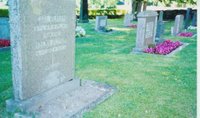When we arrived my mom's 'Spinster Aunt' cousin, named Ulla, picked us up from the Airport. She drove us around to see all of the relatives that we were to visit. Our relatives fed us, fed us, and fed us again. At every meal we were implored to 'take a second tour.' We were stuffed. The older people, who were obviously very excited to see and meet the children of their cousin who left so long ago, could barely speak to us. They didn't know English, and we didn't know Swedish. They pressed presents into our hands and muttered mysterious explanations.
There was one man, who looked exactly like my mom's brother. He talked to us the whole time, and we didn't understand a word he said. Ulla told him that we didn't speak, or understand Swedish, but he never gave up. The funny thing is that is exactly what my mom's brother is like. He doesn't care much if you understand what he's saying, he'll keep talking to you anyways.
My mom, with Ulla's help gathered names, birthdates, and cities, and parishes. Upon learning that we wanted to learn about our ancestors they took us to graveyards. In fact that is what we spent most of our time doing, eating and going to graveyards.
 The graveyards were different there. In a graveyard in the US there are fancy headstones, and faded plastic flowers. In Sweden most of the headstones had a small flowerbed in front of the headstone, that families were responsible for maintaining. Our hosts told us that you could tell when a person's child had gone to the US because there were no flowers planted at their headstone. They all seemed to feel a deep loss because of those who had left. By leaving the emmigrants broke the family apart and the family the emmigrants left behind remembered those who left for generations.
The graveyards were different there. In a graveyard in the US there are fancy headstones, and faded plastic flowers. In Sweden most of the headstones had a small flowerbed in front of the headstone, that families were responsible for maintaining. Our hosts told us that you could tell when a person's child had gone to the US because there were no flowers planted at their headstone. They all seemed to feel a deep loss because of those who had left. By leaving the emmigrants broke the family apart and the family the emmigrants left behind remembered those who left for generations.I came to understand the desire to be sealed to a family. I had always thought, "if we're there together what does it matter if we're sealed or not?" These people, though I had never met them, were my family. I may never see those people again during this life, but I love them dearly. I know them. And my concern for their welfare goes beyond their mortal comforts. I need them, and know that they need me. We are not complete without eachother. They knew that they missed me and my siblings, but we had never known that we missed them.
One of the last houses we stayed at we sang a hymn, "How Great Thou Art," with the family. They sang in Swedish, and we sang in English. As we sang I looked around and my whole family was crying. After the hymn we laughed at our tears, and Ulla translated for our hosts: "They understand why you are crying, they feel it too." I still cry every time we sing that hymn. I think I always will.

1 comment:
Hejsan!
Great post. Made me a little teary-eyed just reading it! Family is priceless...
Post a Comment